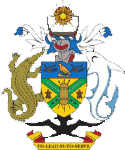The Ministry of Foreign Affairs and External Trade (MFAET) is responsible for maintaining and promoting diplomatic relations, international cooperation and external trade with foreign nations through its headquarters in Honiara and its embassies, high commissions and consulates throughout the world.
Its main task is to promote and safeguard the country's interests and good image overseas through maintaining and enhancing of friendly and cordial relation with states and International and Regional Organizations, especially those states with which it has formal diplomatic ties and organizations of which it is a member.
Functions of the Ministry
The Portfolio subjects formally assigned to the Ministry are:
- Foreign Affairs;
- Diplomatic Relations-Bilateral and Multi-lateral;
- Consular Relations and Consular matters;
- Protocol - Ceremonials;
- Overseas Missions Representation; and
- Treaties and Conventions.
- Trade Issues
Vision
The Ministry of Foreign Affairs and External Trade envisions a sovereign, independent, and peaceful Solomon Islands that enhances economic prosperity and security for its citizens through cultivating diplomatic relationships with other nations and international organisations.
Mission Statement
The mission of the MFAET is to promote and protect the values, interests and well being of Solomon Islands and its citizens through international diplomacy and cooperation.
Structure
MFAET comprises of three main departments; Foreign Affairs, External Trade and Corporate Services. These departments, alongside the country’s 11 diplomatic missions abroad, enable the Ministry to implement its role as the first point of contact in Solomon Islands’ global engagement. In this capacity MFAET is responsible for managing Solomon Islands’ international relations and establishing market access opportunities for the private sector.
To achieve this MFAET, through its role as the Government Ministry responsible for managing Solomon Islands’ international relations, represents Solomon Islands in international settings and trade negotiations and also advances Solomon Islands’ interests abroad, contributes responses to international issues and events, and manages bilateral and multilateral relationships, including international trade and labour mobility.
Solomon Islands is also a member of a number of international organisations such as the United Nations and its specialised agencies and regional organisations such as The Pacific Community (SPC). MFAET is responsible for the overall co-ordination of Solomon Islands’ membership of these organisations and of its participation in the proper international front.
The Ministry also gives advice on and records Solomon Islands’ accession and ratification of treaties, conventions and agreements, deals with consular matters and carries out protocol functions as accorded under the Viena Convention on Diplomatic Relations (1961), the Vienna Convention on Consular Relations (1963) and Solomon Islands’ Diplomatic Privileges & Immunities Act (Cap. 67).
Additionally, through its diplomatic missions abroad, MFAET also assists the Ministry of Commerce, Industry, Labour and Immigration in its responsibility for trade policy implementation and coordination of trade promotion activities. They also identify and encourage potential foreign investors. MFAET also liaises with the private sector and other relevant local Government bureaus and state owned enterprises in promoting and expanding Solomon Islands’ trade and economic relations.
In order to effectively implement Solomon Islands’ foreign policy MFAET, from its headquarters in Honiara, works alongside its diplomatic missions abroad as well as with its diplomatic partners and regional and international organisations. Its small network of overseas diplomatic missions reflects the global span of Solomon Islands’ interests and concerns. The missions are a resource for the whole of Government as well as Solomon Islands’ citizens.
Acts and Legislation
There are a number of domestic and international legal documents that direct the actions of the Ministry and provide the legal foundations for its activities:
(i) The Constitution of Solomon Islands 1978
The Constitution is the supreme law of Solomon Islands. It defines political principles, establishes the core role and functions of the different arms of government and spells out the fundamental rights of all citizens. Critically for MFAET the Constitution provides the process for appointing diplomats such as Ambassadors and High Commissioners.
(ii) The Public Service Act
The Public Service Act is the legislation that provides for the general administration of the entire public service. It also creates regulations such as the Public Service (Overseas) Regulations 1994 which outline employment conditions for diplomats and public servants who work in overseas missions.
(iii) The Diplomatic Privileges and Immunities Act, Cap.
This Act implements the Vienna Convention on Diplomatic Relations 1961, an international treaty that defines a framework for diplomatic relations between independent countries and forms the legal basis for diplomatic immunity. It regulates relations between the host country and sending states.
(iv) The United Nations Charter and Principles.
The United Nations Charter and Principles act as the cornerstone of international relations and define interactions within UN agencies. All members of the UN are bound by these documents.
(v) The Vienna Convention on Consular Relations
The Vienna Convention on Consular Relations is a framework for all consular matters and obligations that independent and host states must comply with, ensuring relevant protocols are upheld and observed.
(vi) The Vienna Convention on the Law of Treaties
The Vienna Convention on the Law of Treaties is a treaty framework pertaining to international law on treaties that have been concluded between independent and sovereign states. It gives recognition to all bilateral treaty agreements that are concluded between states only and not states and internationa
